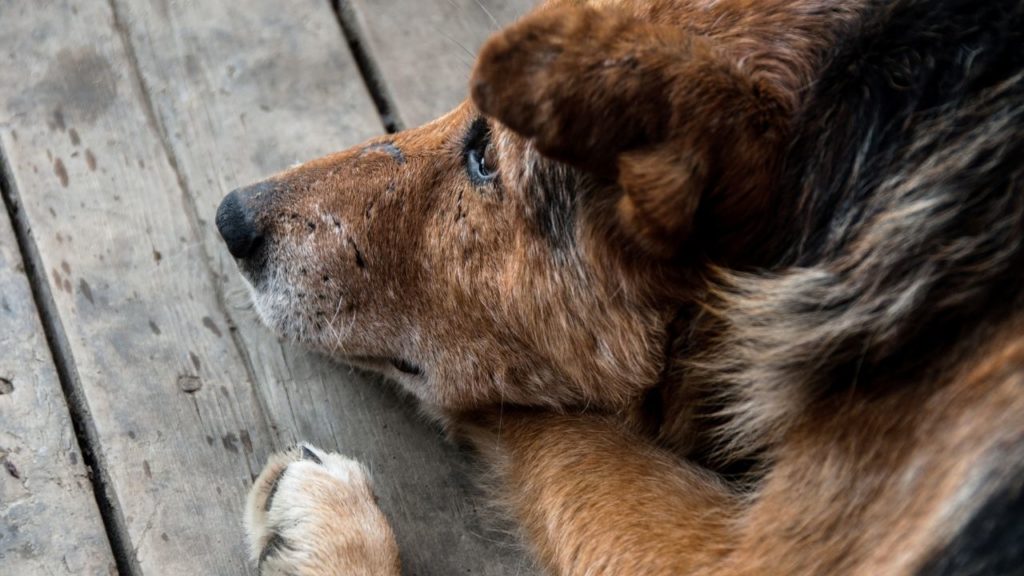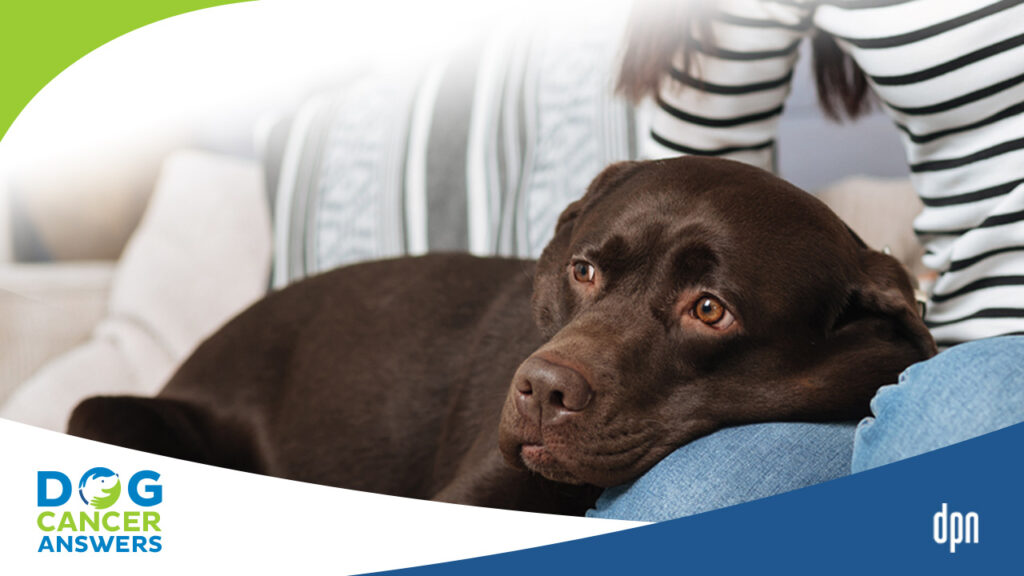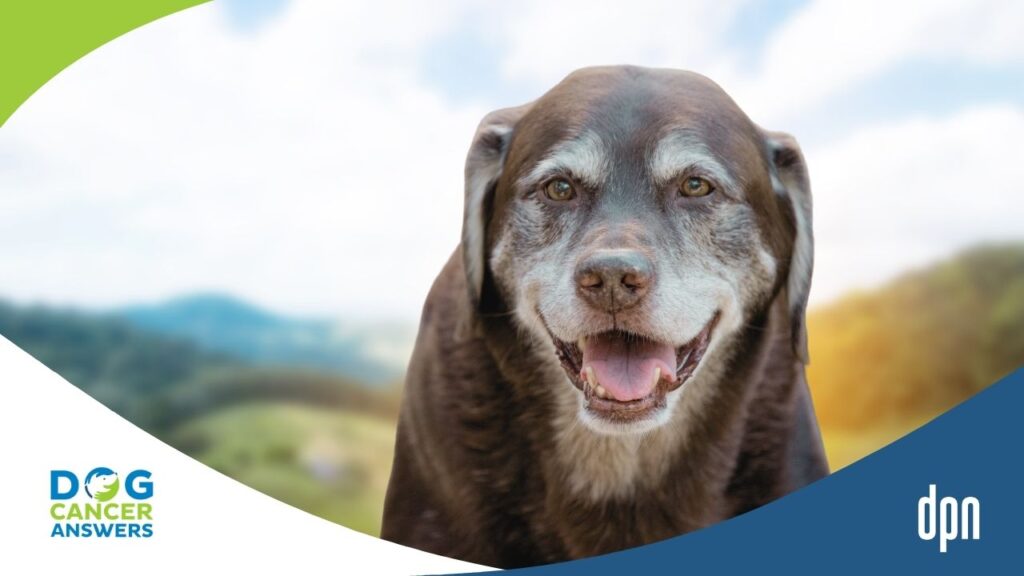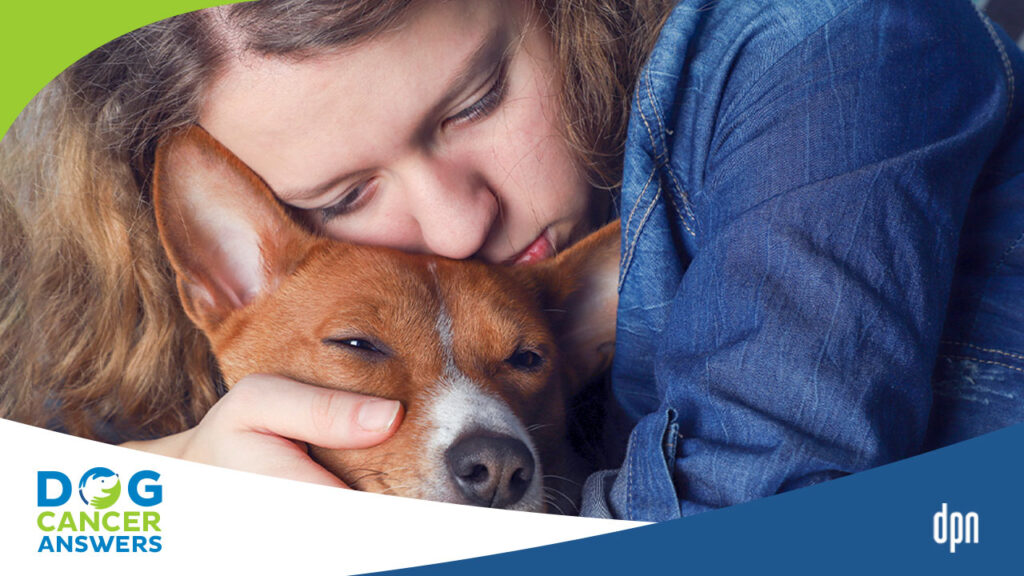>> Dr. Demian Dressler: One of the things that happens with cancer as a chronic disease is depression. And one of the things that people experience and report when they’re dealing with cancer and they’re dying of cancer is they feel very depressed.
>> Announcer: Welcome to Dog Cancer Answers, where we help you help your dog with cancer. Here’s your host, James Jacobson.
>> James Jacobson: Thanks for joining us for today’s Question & Answer show. Today we have a caller named Renny, who asked Dr. Demian Dressler a question that so many dog lovers have to confront: whether it’s best to euthanize her dog or let her dog die naturally. Let’s listen to her question, and then to Dr. Dressler’s answer.
>> Renny: Hello, my name is Renny. My dog has melanoma in her mouth, cancer. She’s had it for about six months. She’s dying. My question is, she does not seem to be in pain, but she’s very weak, has pretty much stopped eating, still takes a little bit of water.
She’s still in the game. Should I euthanize her or allow the dog to die on her own terms? That’s my question. Thanks very much. Bye bye.
>> Dr. Demian Dressler: Hi Renny. I think that’s a really deep question with a lot of philosophical underpinnings, and I don’t know that I really have the right answer, exactly. What I can tell you is a couple of things that we know about from human medicine and human cancer patients.
One of the things that happens with cancer as a chronic disease is depression. And one of the things that people experience and report when they’re dealing with cancer and they’re dying of cancer is they feel very depressed.
And in countries where assisted suicide is legal, those people opt — because they don’t have any further treatment options, and because they’re dealing with a terminal disease — many times they’ll request humane assisted suicide in order to alleviate their suffering. And if we were to then use that information that we get from people in similar circumstances and apply it to our dogs — which I think is a rational approach — I think that maybe that makes sense.
The other thing to think about too, in terms of a euthanasia decision, which is not really what you asked me, but when we make the decision to euthanize a dog, it’s based on a life quality consideration. And I talk about this at length in The Dog Cancer Survival Guide, and that is how you assess life quality?
Well, you look at all of the joys in life, you write them down, and then you ask yourself, well, how many of those joys in life are gone? You could have joy eating, you could have joy having physical activity and exercise, you could have joy just doing normal bodily functions — that actually feels good when you have to go pee, you go pee — um, you could have joy with social interactions and dynamics or social relating. You could have joy expressing yourself, doing play and other forms of expression. And it’s joyful, having a well balanced and healthy mental state, because when that goes away, there’s suffering. So how many of those things have gone?
And if the majority of those are gone, then the life quality therefore is not good. And if you can’t do anything to reclaim those things from a guardianship standpoint or from a veterinary standpoint, then one thinks about euthanasia as the kindest option. So I just wanted to throw that out there as, uh, further considerations for you.
Good question.
>> James Jacobson: Really good question and always a tough decision. Thank you for your call.
I’d like to thank Dr. Dressler for answering Renny’s question. You know, when I had to face this very same question for my dog, Maui, it was really hard to make the decision. The responsibility of taking another creature’s life is awesome and terrible—and it’s all part of being a dog lover and a responsible dog guardian.
If you’re facing this question with your dog, there are several articles on DogCancerBlog.com that might be helpful for you. We’ve included links in the show notes, which you can find in your podcast app or at DogCancerAnswers.com, where you can also listen to or download our entire back catalog. And that back catalog is the best way to help give you the information you need to help optimize your dog’s life quality and longevity.
Just a couple things to wrap up today’s show: don’t forget to hit the subscribe button, and write a review, and tell a friend and your veterinarian about this program.
It’s how we grow and it is the best way that you can help support us so that we can support as many dog lovers as possible in what can be a very difficult time.
<<TOUCH TONE SFX>>
Ah, those musical touch tones … they’re here to remind me to remind you that you can call our Listener Line just like Renny did and leave YOUR question about dog cancer for one of our veterinarians to answer on a future episode. Call 808-868-3200, that is 808-868-3200, or visit our website at DogCancerAnswers.com.
And finally, we’d like to thank our sponsor: The Dog Cancer Survival Guide book by Demian Dressler and Susan Ettinger. It is available wherever fine books are sold both online and in physical bookstores. If you’d like to help support this show, get it right away direct from the publisher. You can get the paperback (with free shipping anywhere in the USA) or the ebook edition for just $9.95. To get either the ebook or the paperback go to this website: DogCancerBook.com. And because you are a listener to this show, if you use the promo code “podcast”, you can save 10%. The website again: DogCancerBook.com and use the promo code “podcast” for 10% off. That is www.DogCancerBook.com.
Our thanks to Dr. Demian Dressler for being our guest today. If you’d like to reach out to him, his website is VetinKihei, spelled K-I-H-E-I, dot com, that is VetinKihei.com. Also, thanks to Renny for her heartfelt question.
Until next time, I’m James Jacobson and from all of us here at Dog Cancer Answers and Dog Podcast Network, I wish you and your dog a warm Aloha.
>> Announcer: Thank you for listening to Dog Cancer Answers. If you’d like to connect, please visit our website at DogCancerAnswers.com or call our Listener Line at 808-868-3200.
And here’s a friendly reminder that you probably already know: this podcast is provided for informational and educational purposes only. It’s not meant to take the place of the advice you receive from your dog’s veterinarian. Only veterinarians who examine your dog can give you veterinary advice or diagnose your dog’s medical condition. Your reliance on the information you hear on this podcast is solely at your own risk. If your dog has a specific health problem, contact your veterinarian.
Also, please keep in mind that veterinary information can change rapidly. Therefore, some information may be out of date.
Dog Cancer Answers is a presentation of Maui Media in association with Dog Podcast Network.








